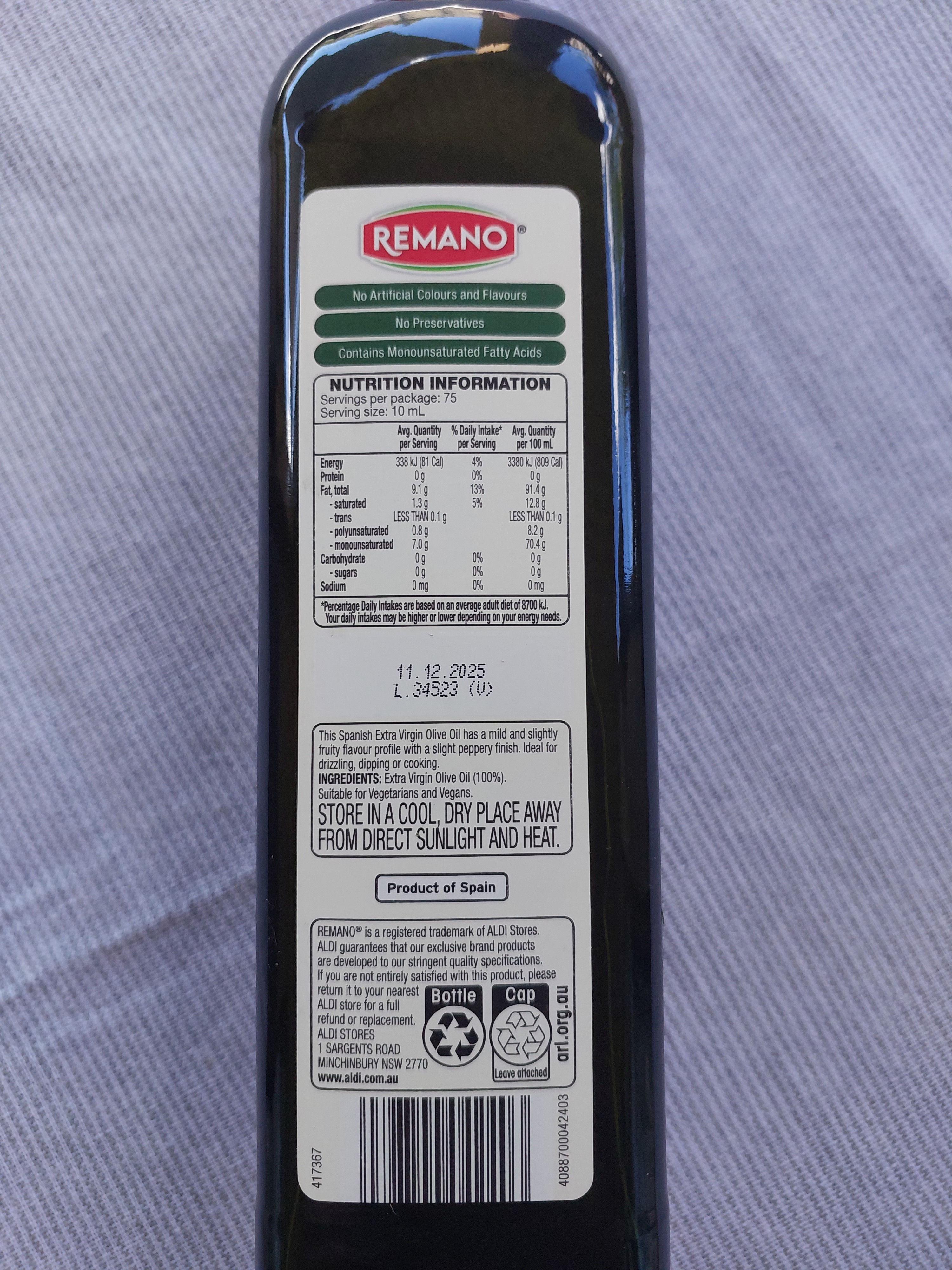- cross-posted to:
- worldnews
- cross-posted to:
- worldnews
Fuck Nestle.
It is not always easy for consumers in any country to tell whether a product contains added sugar, and how much is present, based on nutritional information printed on packaging alone.
That seems like the problem that actually needs solving.
Agreed but our governments have nearly completely checked out of monitoring food less the more immediate consequence type situations. Good luck getting real olive oil for example.
Not sure which countries you are talking about but Australia’s nutritional information seems pretty robust, every food product must list its ingredients, and in order of highest amount to lowest (sometimes with % for things like fruit in syrup, juices, etc).
Also they have a nutrition table where it shows each main factor (vitamins/minerals, sugars, salts, fats, carbohydrates, calories, etc.) And the amount per ‘serving’ (serving size noted) and per 100g of the product. So you can compare the exact same figures product to product and know which is better for you.
There are often other bits of information on the packs, (some of which are optional i believe) such as %of ingredients grown in australia, if its packed in australia, country of origin, ‘health start rating’ (0-5 star scale which shows a quick comparison of how healthy a TYPE of food is. Keep in mind a 4.5 star bottle of soft drink isnt healthy, it is simply more healthy than other soft drinks in its category, ie: a better choice)
That is great to hear. I assume Extra Virgin Olive oil there is actually pure olive oil and not mixed with unhealthy seed oils?
It has to be called something else if it’s adulterated.
That is how it really should be.

The back of my Australian olive oil. All our food and drink has this, except alcohol which they regulate differently.
It is how it should be and it is similar here too, but despite labels like this, there has been plenty of fake olive oil discovered as the government stopped checking for quality. Looks like it is the same in Australia but sounds like they are doing something about it. https://www.abc.net.au/news/rural/2024-04-10/australian-extra-virgin-olive-oil-monitoring-program-starts/103688916
We’re actually quite lucky in Australia and New Zealand with this.
Victim blaming when Nestle could simply do… What’s better for the human body?
Yes, true. But have you considered the shareholders?
Relying on for profit corporations to do what is best for the human body is a fool’s errand.
Strong consumer labelling laws and regulation is the primary way to combat it. Encouraging consumers to actually read the packaging is also required.
Can I sue Nestle and Johnson for milk and baby powder respectively? I am an Indian citizen, so I don’t know if I am entitled to the compensation for damages caused - my mother used their shitty products, and apparently, it killed babies in developing countries.
Unfortunately, Nestle and J&J have spent billions on lawyers and consultants, so even if you could sue it would go nowhere.
Maybe a class action?
Out of all the parasites capitalist society has produced, Nestle executives possibly deserve the
 the most
the mostI am a staunch opposer to the death penalty, and believe no crime, no matter how severe warrants an execution, but I wouldn’t lift a finger to stop the execution of Nestlé executives because they aren’t worth a single calorie spent on their defence.
But think of all the calories they’ve given to us! /s
Nestle’s most popular sub-brand, Maggi, is a Nazi company. They were banned in India for selling noodles with high concentration of lead.
Removed by mod
The problem with boycotting Nestle is that you end up using Unilever products, which is so frustrating. I wish there were alternatives with better supply-chain.
Maggi is dog-shit, soggy trash, their soup tastes like puddle. I love Nissin, they’re the OG noodle-maker. I’ve yet to try Indomie and Wai-wai. Rest of the brands you’ve mentioned are too expensive for me, which is unfortunate.
Removed by mod
Fuck a guillotine, gimme a Colt 1911 and a couple hundred rounds of .22 long; I’ll have it done by dinner time.
Fuck 'em, I found a new love my .357
And my best little back up, a black Smith and Wesson
I got a Glock 19 with a laser inside
And I’m the one you need to watch for when we go on a ride
But why? It is bad for babies OK, but what is the upside for Nestlé? Is it addiction?
One of Nestle’s main evil plans in the Low Income Countries is to aggressively tell mothers that formula is better than breastfeeding, have doctors suggest it, or even give free formula until the mothers’ breastmilk dries up.
Humans evolved to crave sugar which is scarce in nature.
Babies will naturally prefer milk with higher sweetness i.e Nestle Cerelac. This will help convince the mothers to breastfeed less, buy more formula, and/or let their milk dry up.
Edit: here’s UNICEF on these evil marketing practices in Bangladesh.
Add to that.
Nestle has a huge bonus long term from sugar. It is hugely addictive. Haveing children grow up with an early addiction can only benifit them long term. Given how much sugar is a part of other non bany products they sell.
Why do they do this in specifically lower-income countries, where there is less money to be made for them? That’s the part that confuses me.
They do it wherever they can get away with it. They used to do it in the West.
These days though in the West new mothers are likely to receive education about breastfeeding from advocacy organizations, which formed to combat this problem. Such organizations also put pressure on govts to regulate formula and the health system.
Back in the 1950s when La Leche League was formed, only 20% of mothers in the US were breastfeeding.
There’s less regulation in a developing country. So… if you get them hooked on it then, at least, you’ve got easy (albeit low) income. During the developing country maturity they will then be hooked on sugar and less likely to ban it or curb it.
It’s just as any addiction.
Ah, regulations, that’s what I was missing. That sucks.
It’s also not an exclusive situation: that is, selling to the Global South doesn’t in any way impede or prevent their sales in developed nations. It’s just an extra source of income. Sure, they’re making less money per unit sold, but less extra money is better than no extra money. Aggressively marketing to these countries also helps prevent local companies from creating their own competitive products, which protects Nestle’s global dominance interests.
Suffice to say that the list of reasons they would want to do this is long while the list against is very short.
Sugar is roughly as addictive as cocaine.
https://www.healthline.com/health/food-nutrition/experts-is-sugar-addictive-drug
So yeah, addiction is probably the end game.
Cheap source of calories/filler?
Fuck Nestle!
Nestle bad
no. pedophiles are bad. tasting human shit is bad. the feeling when the love of your life walks out of the room for what you know is the last time is bad.
we need a new word for nestle. this company is like Belgian Congo or maybe even “Israeli” levels of fucked up.
Does anyone know why Bangladesh had zero added sugar?
Could it be that Bangladesh has stricter regulations?
Edit: it seems I was wrong. I thought when I read this yesterday it said Bangladesh had no sugar, but looking it up today, that’s no longer the case.
@alvvayson where does it say there’s none in Bangladesh?
There’s even more sugar in Nestle formula in Bangladesh than there is in India.
You are correct.
I could swear that when I read the primary source yesterday, it said Bangladesh had zero sugar.
But going to the link, that’s no longer the case.
Either I was wrong or they corrected it.
Primary source: https://stories.publiceye.ch/nestle-babies/
Obesity is increasingly a problem in low- and middle-income countries.
Isn’t that always going to be the case, regardless of ingredient adjustment? It feels like people who have had very little food will tend towards over-compensating during times of glut - perhaps not so much the generation directly affected, but the care they give to next generations.
As an example vaguely related but less extreme; I was born in 1970 in England to a lower middle-class family. My parents were wartime and post-war babies who had experienced rationing and as a result, I have very strong recollections of being made to “clear your plate” before I could leave the table. (Ironically given this topic, the “there are starving children in Africa who would like that” line was given quite often)
Wasting food was the absolute highest sin I could commit and that’s stayed with me to this day.
DEATH TO NESTLÉ
This is the best summary I could come up with:
Nestlé, the world’s largest consumer goods company, adds sugar and honey to infant milk and cereal products sold in many poorer countries, contrary to international guidelines aimed at preventing obesity and chronic diseases, a report has found.
Laurent Gaberell, Public Eye’s agriculture and nutrition expert, said: “Nestlé must put an end to these dangerous double standards and stop adding sugar in all products for children under three years old, in every part of the world.”
It is not always easy for consumers in any country to tell whether a product contains added sugar, and how much is present, based on nutritional information printed on packaging alone.
The UK recommends that children under four avoid food with added sugars because of risks including weight gain and tooth decay.
Biscuit-flavoured cereals for babies aged six months and older contained 6g of added sugar for every serving in Senegal and South Africa, researchers found.
A Nestlé spokesperson said: “We believe in the nutritional quality of our products for early childhood and prioritise using high-quality ingredients adapted to the growth and development of children.”
The original article contains 774 words, the summary contains 180 words. Saved 77%. I’m a bot and I’m open source!
Corporation ignores guidelines in pursuit of profit. News at 11.
Corporations will not ever self-regulate. If the “global south” can’t even govern their food suppliers at the inadequate and shitty level the US does, then what else can be said? This is a problem that is directly within those governments ability to solve, but they still won’t even do that.
Unsolvable problems with the Nestle Corporation - They Exist and their executives weren’t guillotined in the 50’s.
Solvable problem with the Nestle Corporation - They are legally allowed to sell products within the sovereign countries of the global south while complying with all local laws and regulations.
If only something could be done…
No, don’t try to pass the buck. Wealthy nations are the ones responsible for what their own citizens get up to. Corporations are made up of people and should be regulated by their host nations.
-
Low Income Countries usually lack the resources to test imported products properly. This for eg is why all the poison cough syrup deaths globally.
-
They also lack the resources to finance enforcement of their laws.
-
They are also bullied by the World Trade Organization or threatened with lack of trade in necessities if they try to go against large international corporations with lobbying power.
Don’t noble savage this shit. Most of those countries have functional governments that manage to regulate a lot of stuff, the article isn’t about lack of enforcement. It’s about lack of regulation period. While the WTO does help enforce the neo-liberal order, they aren’t the ones that are doing this. Nestle-LLC incorporated in South Africa is using “too much” sugar in their formula. This is a problem that is wholly within South Africa’s ability to solve.
The article isn’t the be all and end all of the problem though. I’m talking about the wider picture.
I find it bizarre that you think pointing out resource disparity is the racist “noble savage” stereotype.
The behaviour of Western corporations are also wholly within the power of Western countries to solve.
Edit: I don’t get why you want to focus so hard on what the end-users and LICs are doing and not on what the sources and wealthy nations are doing. Its like owning very vicious killer dogs, letting them loose and blaming your neighbour for not having a fence.
Do you want America to enforce regulations upon sovereign nations because they can’t do it themselves? What are you asking for here?
Yikes, of course not.
I want Switzerland to regulate Nestle’s behaviour and I want the US, the EU, and everywhere in the West where it operates to regulate it similarly.
Foe example, if you see my link elsewhere in here, according to UNICEF Nestle is in clear violation of the Breast Milk Substitute Code, and that should be better enforced for a start.
Sure. I do too, but whatever Nestle subsidiary that operates in South Africa, can only be regulated by the South African government. There is no other option today. Not as long as Capitalism is the assumed world economic system.
Parent companies should be legally held accountable for their subsidiaries though.
The thing is we do this with citizens all the time. For example if a citizen of my nation goes and commits pedophilia overseas they are still prosecuted for it. Similarly of they commission a third party to commit a crime for them.
This is something we are beginning to see in an international context with companies that commission crimes such as the landmark Lundin Petroleum (a Swiss company) trial last year, over corporate complicity (incitement really) of human rights abuses in Sudan.
-
If a corporation willingly abuses every loophole in laws or lack of laws even though it is able to know what would be more beneficial for their customers or humanity or at least to know what the law originally intended, then it’s just plain evil shit. It’s still people who work at companies and make immoral decisions. They have the power to decide.
Yes, and since modern capitalist companies are transnational, what should be done? If you are blaming nestle you are correct, but Nestle’s actions within South Africa are outside the scope of America’s laws.
People always try to exploit the disadvantaged. That’s just how humans are programmed. For me, its not shocking at all.
I don’t have to be shocked to be angry.
I can be angry but what good does it do?
Feelings don’t do good but the actions they inspire us to take sometimes do.
Like I said elsewhere in here, formula companies like Nestle used to behave like this in the West as well and it was the actions of activists that changed that.
Knowing about what’s going on is the first step.
Nestle is still evil; more news at 11.













